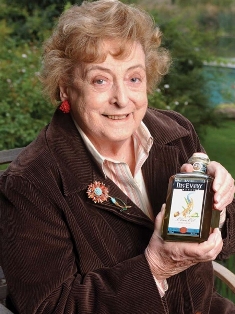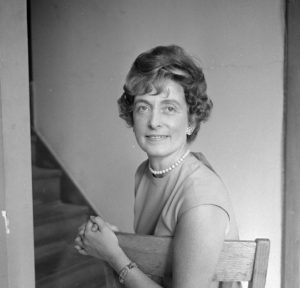# 10 Mad Women of the Peace Corps–Nan McEvoy (Washington, D.C.)

A few years ago I picked up the Friday, March 29, 2013, issue of The Wall Street Journal and glancing through what they call their Mansion Section the name Nan Tucker McEvoy popped out. My god, I thought, Nan is still alive! Alive and well and at 93 she was running with her only child, age 60, a 550 area olive farm 8 miles from downtown Petaluma in Northern California.
The WSJ wrote, “Ms. McEvoy is the granddaughter of Michael de Young, who in 1865 co-founded the newspaper that would become the San Francisco Chronicle. After living in Washington, D.C. for many years, Ms. McEvoy served as chairmen of the board of the San Francisco Chronicle from 1981 to 1995.”
Okay, lets go back to Nan’s Washington years. This is when Nan worked for Shriver at the Peace Corps. Shriver hired her, as he hired everyone that first year, to be the deputy director of the African Regional Office. By the time she came to the agency, she was a veteran reporter, having covered state politics in California, national politics in Washington and international conferences and events during ten years with the San Francisco Chronicle, the New York Herald Tribune and the Washington Post. She had lived in France, Italy, Spain and Japan. She went to the Peace Corps as deputy of the African Region and her first job was an eight-nation survey of Peace Corps projects in Africa in the summer of 1962.
Next, she became head of Talent Search and charged with finding people for overseas staff position. This was (and is still be) the most important job in the agent. Shriver would say in ’62 that the The ‘Rep,’ as they were called, would be crucial to the success or failure of the Peace Corps.
Nan would be the first woman to run Talent Search. She followed a string of ‘super charged’ men to get the nod from Shriver to go out and find the “best and the brightest’ for the Peace Corps.
The first person to run Talent Search was Bill Haddad. At the time, Haddad was an Associate Director. By the fall of ’61, the job went to Glenn Ferguson, a wonderful man, who later became president of Clark University. By November, Ferguson was off to Thailand as Rep and one of the few African-Americans at the agency, Franklin Williams, took over, then the writer Willy Warner, and next Jay Rockefeller IV, and finally Nan.
What Shriver was doing was putting ‘stars’ into the position to show that his standards for overseas Reps were high. In those early days, for every thirty applicants, only one would survive.
I’ll come back to the early Reps at another time in another blog, but first to Nan Tucker McEvoy in California living on a farm that has 15 buildings and 18,000 olive trees and a frantoia, or traditional olive press, from Italy. The ranch sells its award-winning olive oil, honey from its beehives and other products at the San Francisco Ferry Building and elsewhere in the world.
The article goes onto say that besides raising and selling olive oil, she has contributed $10 million to the rebuilding of San Francisco’s de Young Museum, and she has been a longtime supporter of the Smithsonian American Art Museum.
One more story about Nan from the early days. In late 1962, Shriver had what was called around the original Peace Corps Maiatico building a Buzz Bomb. This was an intercom system connecting Shriver instantly with staff members he most frequently need to reach. Having one on your desk at HQ meant you had power, but a price was paid.
Nan had one on her desk and Sarge called her all the time.
As Nan recalled in Come As You Are, Coates Redmon’s book on the early days, “I heard that horrible sound several
times a day for over a year. It was always a hideous prelude to an impossible request. I learned to cope with it by counting to five very slowly every time it went off so that I wouldn’t sound addled when I answered. I’d just say breezily, ‘Oh, hi, Sarge. What’s up?’ And he’d say, “Nan! Listen! We’ve gotta have a Portuguese-speaking basketball coach for Brazil.'”
And Nan, more often than not, would find the right person for Brazil, as well as for many other overseas positions.
There weren’t many women in a senior position in those Mad Men days of the agency, but Nan and one, and like many other women of that time, she made a difference.

Nan McEvoy is pretty special as this post shows. I’m glad she is being still about and even remembered.